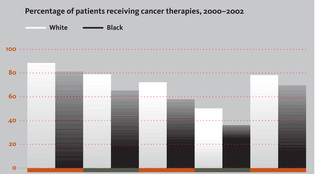 loading
loading
FindingsCancer care in black and whiteRacial disparities in treatment.  Chart: Mark Zurolo '01MFA Source: Gross et al., CancerView full imageFor more than a decade, the medical profession has been trying to redress the disparities in levels of healthcare provided to different racial and ethnic groups. "And we wondered," says Cary P. Gross, associate professor of medicine, "if we were making any headway." The answer -- at least in cancer treatment -- is no. In the January 7 online issue of the journal Cancer, Gross and his colleagues show not only that black patients were significantly less likely than their white counterparts to receive therapy for several common cancers from 1992 through 2002, but also that the gap remained unchanged during that entire period. The team analyzed nearly 144,000 cases of breast, colon, lung, prostate, and rectal cancers using a Medicare database. They chose Medicare partly because most cancer patients are over 65 and partly so they could compare groups of people who had equal access to insurance coverage. The team found gaps between the races for every kind of cancer they looked at. Among those with early-stage lung cancer, blacks were 19 percent less likely than whites to have tumors surgically removed from 2000 through 2002. Blacks with rectal cancer were 27 percent less likely to get additional chemotherapy after surgery. Blacks with colon cancer were 24 percent less likely to have post-surgery chemotherapy. Black men with prostate cancer were 11 percent less likely than white men to get either surgical or radiation treatment. And black women who underwent lumpectomies for breast cancer were 7 percent less likely than white women to receive radiation therapy. Gross notes that the team investigated many factors that could influence treatment -- age, economic status, overall health status, and stage of disease development (in order "to eliminate concerns about whether minority patients present at a later stage"). Their analysis, he says, showed that "none of these factors explain the disparities." Nor does individual racial bias, says Gross. "We're looking at a systemic problem."
The comment period has expired.
|
|